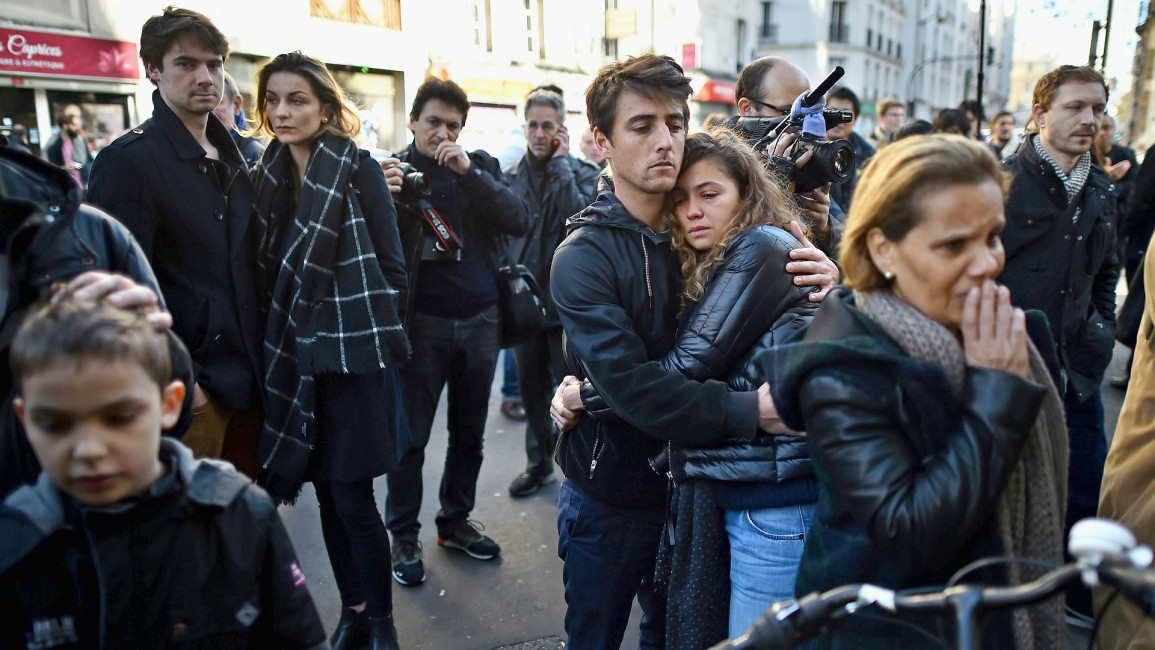Islamic State group claims Paris attacks
So called Islamic State claimed responsibility a series of attacks that killed 129 people in Paris.
In an online statement, the group said its fighters strapped with suicide bombing belts and carrying machine guns carried out the attacks in various locations in the heart of the French capital.
The statement came as French police were hunting possible accomplices of eight assailants who attacked Paris concert-goers, cafe diners and soccer fans in this country's deadliest peacetime assaults, a succession of explosions and shootings that cast a dark shadow over this luminous tourist destination.
Parisians who went to sleep in horror at initial news of the attacks woke Saturday to learn that at least 129 people were killed and scores wounded. World leaders joined together in sympathy and indignation, New York police increased security measures, and people around the world reached out to friends and loved ones in France.
The perpetrators remained a mystery, their nationalities, their motives, even their exact number. Suspicion turned to Islamic extremists, who are angry at France's military
| The attacks, on at least six sites, were near-simultaneous. |
operations against the Islamic State group and al-Qaeda affiliates, and who targeted satirical newspaper Charlie Hebdo this year.
French President Francois Hollande convened a special security meeting Saturday morning. He vowed to be "merciless" with the nation's foes following what he called unprecedented terrorist attacks.
In a new development for France, seven attackers died in suicide bombings, the Paris prosecutor's office said. Another was killed by police, and prosecutor's office spokeswoman Agnes Thibault-Lecuivre said authorities can't rule out that other attackers are at large. Investigators are also looking for possible accomplices.
The attacks, on at least six sites, were near-simultaneous.
Three suicide bombs targeted spots around the national stadium Stade de France, north of the capital, where the French president was watching an exhibition soccer match between the French and German national teams.
Then gunshots overpowered the clinking of wine glasses in a trendy Paris neighborhood. Blood hit the pavement after gunmen targeted a string of popular cafes, crowded on the unusually balmy Friday night, and about 37 people were killed, according to Paris Prosecutor Francois Molins.
The attackers then stormed a concert hall, the Bataclan, hosting an American rock band, opened fire on the panicked audience, then took them hostage. As police closed in, three detonated explosive belts, killing themselves, according to Paris police chief Michel Cadot.
| Hollande declared a state of emergency and announced renewed border checks. |
Another attacker detonated a suicide bomb on Boulevard Voltaire, near the music hall, the prosecutor's office said.
The Bataclan was the scene of the worst carnage.
Jihadis on Twitter immediately praised the attackers and criticised France's military operations against Islamic State extremists.
State of emergency
Hollande declared a state of emergency and announced renewed border checks along frontiers that are normally open under Europe's free-travel zone.
"A determined France, a united France, a France that joins together and a France that will not allow itself to be staggered even if today, there is infinite emotion faced with this disaster, this tragedy, which is an abomination, because it is barbarism," Hollande said.
Barack Obama, speaking to reporters in Washington, decried an "attack on all humanity," calling the Paris violence an "outrageous attempt to terroris innocent civilians."
A US official briefed by the Justice Department says intelligence officials were not aware of any threats before Friday's attacks.
The violence raises questions about security for the millions of tourists who come to Paris and for world events the French capital routinely hosts.
Some 80 heads of state, including possibly Obama, are expected for a critical climate summit in two weeks. In June, France is to host the European soccer championship with the Stade de France a major venue.
And Paris-based UNESCO is expecting world leaders Monday for a forum about overcoming extremism.
Iranian President Hassan Rouhani canceled a trip because of Friday's attacks. Hollande canceled a planned trip to this weekend's G-20 summit in Turkey.
France has been on edge since January, when Islamic extremists attacked the satirical newspaper Charlie Hebdo, which had run cartoons of the Prophet, and a kosher grocery. This time, they targeted young people enjoying a rock concert and ordinary city residents enjoying a Friday night out.
France has seen several smaller-scale attacks or attempts this year, including an incident on a high-speed train in August in which American travelers thwarted an attempted attack by a heavily armed man.
French authorities are particularly concerned about the threat from hundreds of French radicals who have traveled to Syria and returned home with skills to stage violence.
Though it was unclear who was responsible for Friday night's violence, the Islamic State is "clearly the name at the top of everyone's list," said Brian Michael Jenkins.
"The big question on everyone's mind is, were these attackers, if they turn out to be connected to one of the groups in Syria, were they homegrown terrorists or were they returning fighters from having served" with the Islamic State group, Jenkins said. "That will be a huge question



